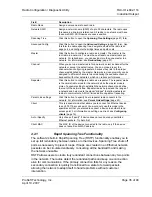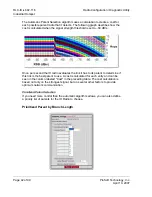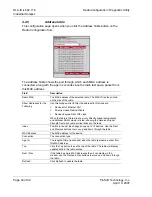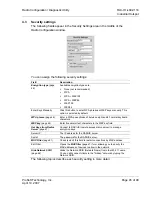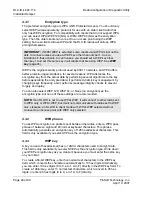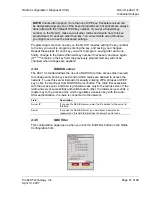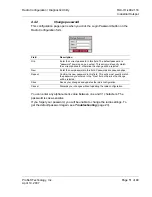
Radio Configuration / Diagnostic Utility
RLX-IH
♦
802.11b
Industrial Hotspot
ProSoft Technology, Inc.
Page 39 of 99
April 10, 2007
4.2.3 Advanced
Settings
This configuration page opens when you click the Advanced Configuration button
on the Radio Configuration form.
It is important to allow many industrial protocols to communicate properly over
the RLX-IH radios. The standard 802.11 AP operation for transmitting broadcast
messages is to accumulate them and transmit them only on specific time
intervals. This allows clients that are in power-save mode to wake up at the
synchronized time interval and receive the broadcast packets. However, the
power-save mode is rarely used in industrial networks. Additionally, many
industrial protocols utilize multicast traffic, which is sent as broadcast messages
over the wireless network. By enabling immediate broadcasting, these multicast
messages are not delayed by the wait for the next time interval to occur before
they can be transmitted. This results in improved network performance.
RLX-IH radios support IGMP v1 and v2. The default operation of the RLX-IH
radios is to have IGMP functionality enabled, although the user can disable IGMP
entirely. Additionally, the user can specify settings associated with IGMP filtering
and snooping. Unknown multicast addresses can be sent to all ports (flood) or to
none (filtered) by changing the IGMP Multicast Filtering option. The user can
specify whether or not the radio will generate IGMP queries, and configure the
query interval time.
By RFC specification, only one device on a network should generate IGMP
queries. As such, RLX-IH radios will only send a query if another device has not
sent a query within its Query Interval setting, even if Query Generation is
enabled.
The settings on this form also allow you to configure the transmission rate and
broadcast mode to optimize this radio's use on an industrial network.
Field Description
Default TX Rate
The data transmission rate in Megabits per second, for this radio.
Available options are:
1 Mb/sec
2 Mb/sec
5.5 Mb/sec
11
Mb/sec
Immediate Broadcasting
Forward multicast traffic immediately, rather than waiting for specific
time intervals.
Block General Probe
Requests
Do not respond to general probe requests that are not specific to the
radio's SSID.
IGMP Multicast Filtering
Disabling filtering will cause the radio flood multicast packets to all
ports.











